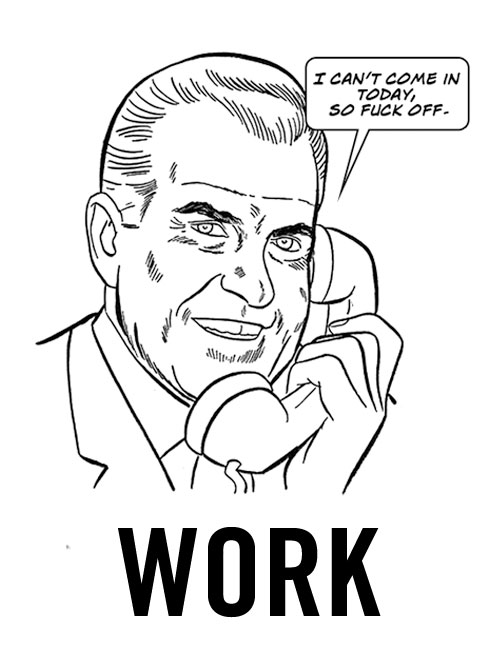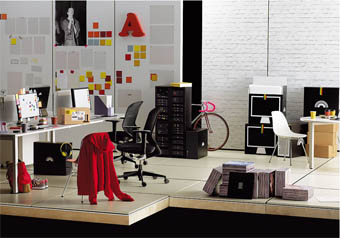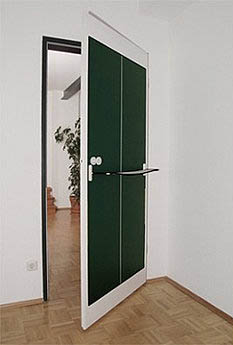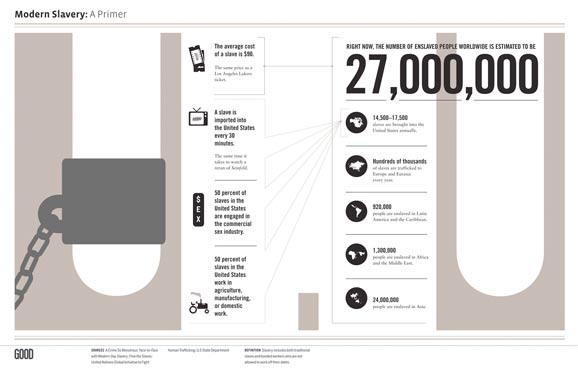Category Archives: Why do we work?
Fuck off

Hey you, work harder!
And cleaning a messy office
Messy office
Where am I?
You are a business person, world-wide head of facilities of a large global corporation. You are on a tour, visiting many of the branch offices around the world. Your corporation has a global agreement with hotels, furniture suppliers, real-estate agents, airline companies, ad agencies, architects, coffee providers, telephone systems. When you step out of a taxi and walk, suit case in hand through security gate of the branch office you are a little confused, doesn’t the building look the same as yesterday? Wasn’t that the same coffee shop on the ground floor? The same glass box structure, elevated to great heights, the same revolving door entrance, the same curved reception counter, the same Barcelona chairs are waiting for you, and well, obviously the company logo is the same. Yesterday you were in Bangkok and the heat outside was thick like a wet blanket clinging on your shirt. Today you landed at a foggy and cold, autumn airport and you had to wear a raincoat. But inside the office tower were you company has this branch the temperature is set at an equal 23 degrees throughout the whole building. Despite the difference in temperature in this country and Thailand you noticed that the temperature inside this building is almost equal to interior temperature of the office in Bangkok. As you walk through the office, you walk past identical office desks, chairs and storage units, identical to the ones you were walking past on the other side of the globe only a few days ago. The office looks efficient, with its neat rows of organically shaped desks and low partitions. You can see the grey skyline stretching for miles outside, notice that it has started to rain again and feel relieved you took your umbrella with you. Inside the office the spaciousness continuous, with its glass partitions that divide but do visually not separate the various meeting rooms, private offices and other enclosed spaces. The office is colourful, walls are painted in bright orange and blue to contrast the greyness outside. People are busy at work, some are sitting behind their computer screens, writing emails, inputting data, on the phone or running towards appointments. The buzz of activity gives you the comfortable feeling that business is going well here. You step into the meeting room and are greeted by colleagues whose faces or names you recognized from the video conferences or internal email memos. As you drink your coffee with the familiar logo on the cup, and listen to the report in English while watching a presentation on the screen, your eyes skim to room and all of a sudden you …
forget were you are.
In your mind you go through your travel schedule: tomorrow you will continue to Brussels, after that Copenhagen and finally Rome. When you started your trip you were anxious to visit all these branches and were feeling a strange combination of anticipation as well as discomfort which one has when visiting new, unknown places, countries where you don’t speak the local language. But after your first stop in Japan, this, at the same time nervous and exiting feeling has disappeared, and the trip has become one of routine. In the hotels, the airports, the taxis, everyone you meet speaks English. The breakfast buffet at each hotel is always the same: the same choice of fruit, the brown, white and pastry breads, the same selection of eggs, and even the choice of Japanese breakfast was available in almost each hotel you stayed in. But where are you … now? You look around the room, people are wearing Armani suits, Prada glasses, scribbling with Montblanc pens in their Moleskine notebooks. You start to sweat, your heart is racing, you feel dizzy, you forget about the presentation, this is ridiculous, you are trying to remember, but you just don’t know where you are.
The presenter, a pretty asian lady in her early thirties, dressed in a black one piece, opens up a Powerpoint presentation titled “Presentation for John Candy, Head of Facilities Worldwide”. You realize you have seen this opening slide 12 times now. After all you have been to twelve cities in 20 days, and as you sit in this meeting room on the same type of chairs you sat a few days ago, in a similar kind of meeting you feel as if it the people have moved while you and the city remained in place. A tall blond man with a Brooklyn accent asks you when you would like to see the new premises, your are lost are lost, lost for words. But more than being lost for words you feel you are lost in space…
Ian Curtis in the office?
It is very ironic to see an image of Ian Curtis to appear in a furniture catalogue. Very ironic indeed.

Modern Slavery
We might have thought that slavery is something of the past, or of a dystopia future, but 27 million worldwide are enslaved according to this data from the GOOD magazine.
Â
Self Employment
According to this article, 36,000 people have started working for themselves in Canada this year. Are these the more positive aspects of a recession that when people are fired or forced into “early retirement” that makes them think and look for other opportunities such as starting their own business?
Here are some examples of people who thought that now is the ideal time to start their own business, many of them from their own home such as Sarah Schueller who set up Stampin’ Up
She explains that: “I do rubber stamping and scrapbooking classes either in my hostess’ homes or in my own home,” she says. “The beauty of a business like this is that it can be exactly what you want it to be.”
“You can work very minimal part time hours and fit them in around the kids. In this economic climate, everyone is strapped for cash or could use a little extra boost. I found that it worked really well for me because I could fit it in around soccer games and I wasn’t committed to 40 hour work weeks. It was flexible but yet it was profitable.”
Another very interesting article I stumbled across writes that
“In New York City, one of the few municipalities that tracks self-employment carefully, there were 807,750 self-employed workers in 2006, according to new numbers from the comptroller’s office. That’s about a fifth of the roughly 4 million nongovernment jobs that existed in the city before the current financial crisis. (These days, after all the layoffs, the proportion may be even higher.) And of the 773,000 jobs that Gotham added from 1981 to 2006, a stunning 491,000 were people working for themselves, making self-employment the biggest source of job creation in the city.”
So how did this raise in self-employment start? One reason could be the wave of outsourcing by companies to remove all the non-core businesses from their payrolls and outsource these. All this has lead to people doing translation, web design, accounting and corporate training within companies now providing the same services as independent contractors. Technology has also made it easier for anyone to not only start-up their own company but to be able to reach-out worldwide. Then there is the work-life balance issue. True working at home has its advantages: start to work whenever you want to, no commute, ability to see your children and spouse more often, and you can decide when you want to work and when not.
Net hubs
In the early days of the web (don’t worry this is not a “once upon a time” story), in the early days of the web the limited access due to its technical nature meant that the people who used it were seen as hermits, people-shy geeks, who felt secured by the isolating element of the web. The early days of the web reinforced the geek’s idea of now finally (at last!) they were able to live without ever having to physically meet anyone. Now it was possible to order everything over the net, with the keyboard and the flickering green screen acting as a safe buffer between the modern day seclusive and the outside world. The internet acted as an individualizer. Ironically reinforcing the individuality of those who were afraid of social interaction as they went online they needed to proof their individuality but through their specific access codes, user names, passwords could hide behind larger than life avatars. The individualizing element of the web created the Kafkaesque fear that the web would turn us all into hermits, each of us psychologically unable to interact with anyone anymore. Even for sex we would use the computer for love, as the Kraftwerk song goes.
But as the net is becoming easier to access to more and more people we start to see that it is a great way of actually bringing people together. For example, when I joined Twitted recently I noticed that there are two types of tweets (is this how you call the people who are on Twitter?). There are those that are hunting for connections, their goal is to get as many connections as possible. Why? Maybe for to satisfy their ego (I have 100 or 1500 or 29,678 friends and that is important for ME to show this to everyone). What I also noticed is that apart from those that select their connections based on actual interesting topics, others are linking with people in their immediate vicinity. Although there is no actual filter in twitter to select locations (as far as I know) to do this, I noticed that many people based in Tokyo had a large part of their links to people based in Tokyo (or immediate vicinity).
One day after I went to a networking event, a message the next day on Twitter thanked 5 or 6 names that I knew from Twitter to having attended the event. I knew the online names, but was surprised that they were at the event as well. My point is that the border between online and offline is blurring. The net now provides ”us with the opportunity to meet more people than would be physical possible. But in contrast most of those online are not hermits, on the contrary many of the people online are very active both online as well as in real space. I have written in more detail about this in my chapter for the Denmark symposium paper “Tokyo City of Networks”. In the paper I argue that in cities such as Tokyo the net is providing an extra layer for the variuous tribes who are transversing the transitional spaces that is called Tokyo. I believe that when we think about the future of work, it are those urban nomads who easily jump from virtual into real space and back again that should be seen as the driving forces of where our societies are going. Many of the people I meet recently don’t have a typical nine-to-five-job anymore, but they all have professional passions and they meet up with liked minded people to share and discuss these passions. In a way the social networking sites are becoming more like dating platforms where contacts are initiated rather than merely ephemerally satisfied.
This is where space comes back again. Many of the network events are taking place in cafe’s or restaurants where presentations are given, name cards are exchanged, and new connections are made. Even though interesting by itself, wouldn’t it be even better to rather than merely talking and listening there could be a place where you could all of this, plus have the opportunity to work together? Maybe the future of work, and the future of the office is in these kind of net hubs like this co-working space in Portland called Nedspace. The net as a social platform staged on a local level.



